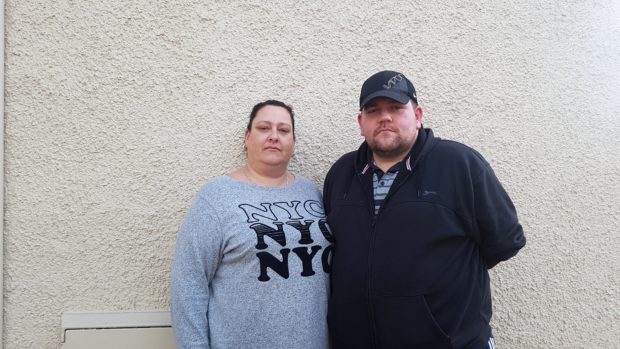When Michelle Szombara first began chatting to Alan Clarkson online, she thought she had met the man of her dreams.
But the relationship quickly became a nightmare when the “funny and polite” man she fell for stole more than £60,000.
Over four years, Clarkson manipulated and controlled Ms Szombara, who eventually lost her home and had to declare herself bankrupt.
Now the 40-year-old is backing a police campaign to raise awareness of romance fraud.
Police Scotland want people to be aware of scammers who target people on dating sites as part of a crackdown on acquisitive crime.
Ms Szombara first met Campbell online, and the relationship quickly developed.
“He was like any other normal person; funny and polite,” she said. “We started texting back and forward and within a few weeks we met up. He turned up at my house with some spare clothes and stayed for the next four years.”
But Clarkson began asking for money, telling Ms Szombara he could not access his bank account and was in debt – even showing her fake paperwork to prove he could pay her back.
He then convinced her to let him take over the rent for her home in Fife.
“I ended up over £7,000 in rent arrears and my council tax wasn’t getting paid,” Ms Szombara said.
“It got to the stage we were living off of nothing. I was so stressed. I did every hour going at my work to be left with nothing. I had a lovely house and I lost everything.
“I was embarrassed and ashamed that I got my mum and dad involved. They worked all their days, only had a couple of years left on their mortgage and we’re now living in a council house because of him.”
Last month, Clarkson, from West Lothian, was jailed for 42 months after being convicted of stealing £60,000 from Ms Szombara and her parents between 2010 and 2014.
She said: “We had a few people saying to us things weren’t right over the years. We had doubt in the back of our mind but we didn’t want to believe it.
“It nearly ripped our family apart. I hate what he’s done to my family.
“My advice would be to be really cautious with everybody.
“Throughout the four years we were together I never met his family so always check someone’s background.”
Romance scams are often reported as a fraud and many victims don’t come forward due to embarrassment, lack of evidence or a feeling it might have been their fault.
Fresh figures show that from April to December last year, the number of fraud incidents, including romance scams, increased by 21%.
Detective Superintendent Nicola Shepherd said: “Romance fraud is largely unreported and we want more victims to come forward.
“It can have a shattering effect on people who may be embarrassed that they’ve fallen victim to a scam and don’t want to speak about their experience.
“Criminals can be extremely convincing and they prey on people who are emotionally vulnerable, particularly online.
“It can be easy to get caught up with the attention you receive but it’s important to stop and think if a stranger’s actions are genuine.
“There are warning signs for these scams and one of them is a request for money. Don’t send money to someone you’ve never met, or even recently met, regardless of the story they tell you.”
